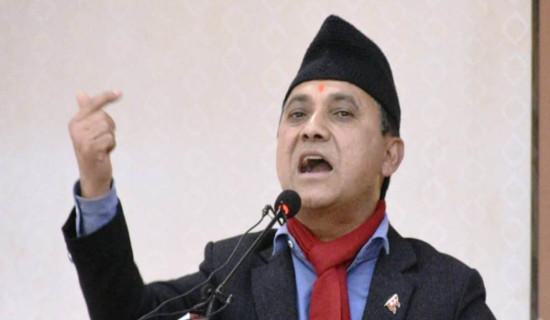- Saturday, 17 January 2026
TJ Process Moves On
The three major political parties – Nepali Congress, CPN-UML and CPN-Maoist Centre – have finally ironed out their differences on amending a Bill on Investigation of Enforced Disappeared Persons, Truth and Reconciliation Commission Act (2014). This has raised the hope for the conflict victims who have been waiting for justice for around two decades. A three-party panel comprising Ramesh Lekhak of NC, Mahesh Bartaula of UML and Janardan Sharma of Maoist Centre was formed on July 1 to solve the contentious points that had prevented the Bill from entering the federal parliament. Previous government led by Pushpa Kamal Dahal Prachanda had formed the taskforce after the Law, Justice and Human Rights Committee of the House of Representatives (HoR) could not sort out the disputes even after several rounds of discussions.
Ensuring justice to the conflict victims has been a critical component of the Comprehensive Peace Agreement signed by the then CPN-Maoist and the government in 2005. After years of haggling, the Commission of Investigation on Enforced Disappeared Persons and Truth and Reconciliation Commission (TRC) were formed to investigate into the serious human rights violations that included murders, rapes and sexual violence. More than 17,000 people were killed while thousands disappeared during the decade-long armed conflict. The families and relatives of deceased and missing people lodged more than 3,223 complaints of enforced disappearances at the Disappearances Commission, and 63,718 cases were filed at the Reconciliation Commission. But due to the differences between the major political forces, transitional justice process continued to hit roadblocks, dampening the expectations of the victims.
Last week, the panel claimed it resolved four contested issues related to murders, grave human rights violations, and punishment and amnesty to the perpetrators. The panel agreed to define intentional or arbitrary killings as murders and the grave human rights violations. Similarly, the victims' consent is compulsory for reconciliation with the perpetrators. If the victims are not ready to grant amnesty to their alleged perpetrators, s/he can knock at the court's door for justice. The victims have to either approach the Office of the Attorney General to proceed with the criminal cases or they can themselves file the cases at the regular courts. The Attorney General’s Office can decide whether the case merits for litigation process at the court.
The committee has struck a consensus on reducing the prison term of perpetrators by 75 per cent. The alleged offenders should bear only 25 per cent of their sentence term. The victims might have reservation over this provision. In yet another important consensus, the panel decided to identify security personnel killed or injured during the insurgency as conflict victims and give compensation to them. The displaced Maoists are also eligible to get the reparation from the state. Providing succor to the discharged fighters has been the persistent demand of the Maoist Centre.
There is also an agreement to fill the vacant posts in the two commissions soon. They should play an important role in tackling the conflict era cases to the satisfaction of all sides. It is the state's responsibility to deliver justice to its citizens who have been meted out injustice during the political, social and armed conflicts in the society. With the breakthrough in ending discords over the TRC Bill, the country stands to settle the last part of the peace process. If the reconciliation process moves smoothly, Nepal will present a credible model of the conflict resolution and restoration of lasting peace.

















